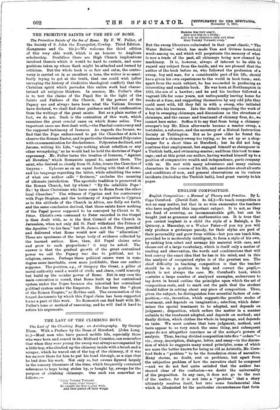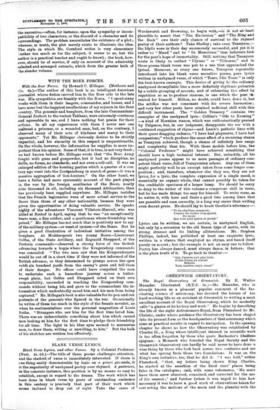ENGLISH COMPOSITION.
not an easy matter, but that in no wise exonerates the teachers
who have neglected this important subject. It is not, as they are fond. of averring, an incommunicable gift, but can be
taught just as grammar and mathematics can. It is true that you cannot implant in a child the style of a Raleigh, a De
the Apostles "to his face," but St. James, not St. Peter, presided Qtuncey, a Macaulay, or a Walter Pater—if you try you will only produce .a grotesque parody, for their styles are part of and delivered what Rome would now call the "allocution." their. personality and grow from within—but you can teach him, These are specimens of the large body of evidence collected by provided he is moderately intelligent, to form a style of his own, the learned author. How, then, did Papal claims arise
by making him select and arrange his material with care, and and grow to such proportions ? it may be asked. The reading and observation, the words and combinations that will !
I the analysis s of recognised styles is of the greatest use. The supposes. The position, e.g., of Gregory the Great, a pi
I chief difficulty in teaching composition is that the teacher pillar of
should is in a position to help and correct the pupil,— moral authority amid a world of strife and chaos, could scarcely which. is not always the case. Mr. Cornford's book, which but build up the secular power of Rome. But in any case the contains a. large number of analysed examples, endeavours to main contention is sound, that Rome built up her centralised
lay down in broad outline the principles upon which the art of system under the Popes because she inherited her centralised composition rests, and to mark out the path that the student politioal system under the Emperors. She has been the "ghost
should follow in setting about any piece of composition. Thus, of the Roman Empire," as Hobbes said. The examination of the
position,—viz., invention, which suggests the possible modes of forms a part of this work. No Romanist can find fault with Mr. treatment, and depends on imagination ; selection, which deter- refute his arguments.
mines the special treatment to be adopted, and depends on judgment; disposition, which orders the matter in a manner suitable to the treatment adopted, and depends on method; and finally diction, which clothes the whole in language, and depends on taste. We must confess that here judgment, method, and taste appear to us very much the same thing, and subsequent pages do not altogether convince us of the authpr's powers of analysis. Thus, having divided composition into five " orders "— viz., story, description, dialogue, letter, and essay—in the discus- sion of which he suggests many sound principles, some of which are none the better known for being as old as Aristotle, Mr. Corn- ford finds a " problem " to be the foundation stone of narrative. Many stories, no doubt, rest on problems, but apart from the subjective problem of how the narrative shall be composed —and we do not feel quite satisfied that the author has steered clear of the confusion—we doubt the universality of the proposition. In any case, it does not go to the root of the matter, for it is not into a " problem " that a story ultimately resolves itself, but into some fundamental idea which is illustrated by the particular circumstances that form
the narrative,—often, for instance, upon the sympathy or incom- patibility of two characters, or the discord of a character and its surroundings. The problem necessitates the existence of a plot ; whereas, in truth, the plot merely exists to illustrate the idea. The style in which Mr. Cornford writes is very elementary 'rather too much so for the subject, it seems to us, but the author is a practical teacher and ought to know) ; the book, how- ever, should be of service, if only on account of the admirably selected and arranged extracts, which form the greater bulk of the slender volume.























































 Previous page
Previous page